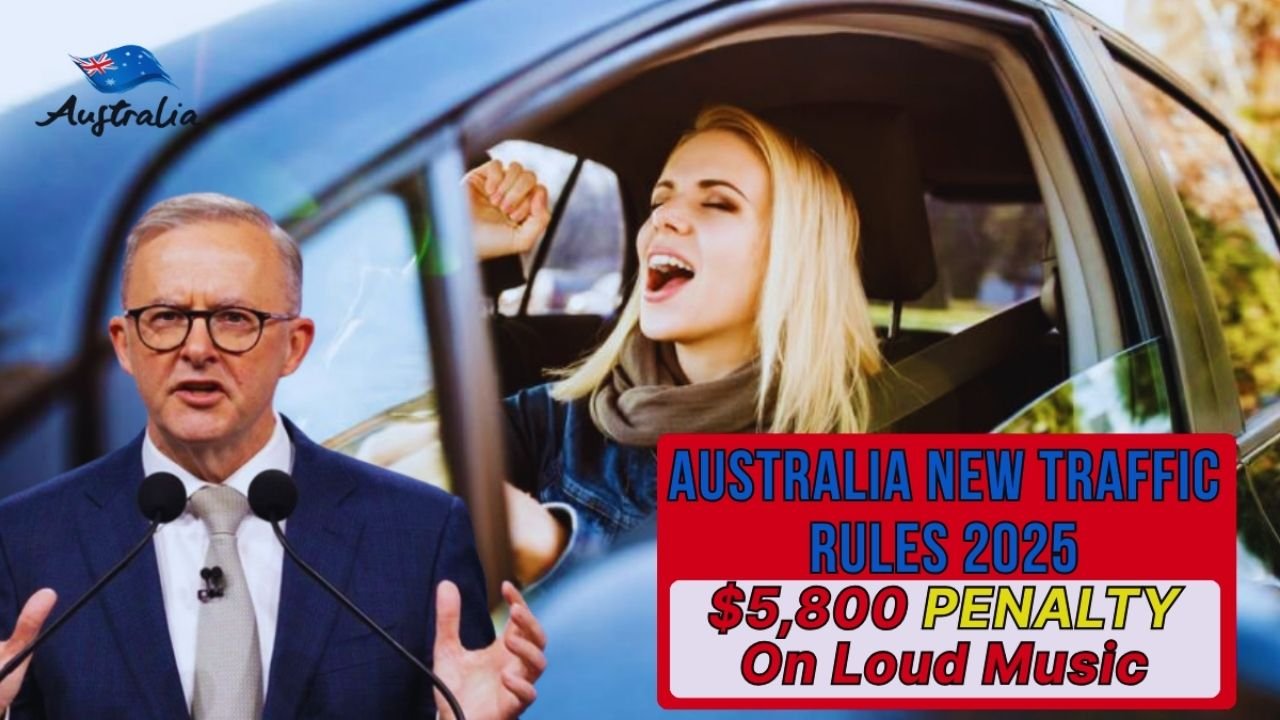In 2025, Australian authorities have introduced stricter traffic rules targeting loud car music, making it one of the toughest regulations against noise pollution in the country. Drivers who play music at excessively high volumes risk fines of up to $5,800, alongside other penalties such as demerit points and, in some cases, vehicle seizure.
Why the New Rules Were Introduced
Authorities have received thousands of complaints over the years about disruptive car music, particularly in residential areas. Loud music can:
- Distract drivers and reduce awareness of surrounding traffic.
- Make it difficult to hear emergency vehicle sirens.
- Increase accident risks in urban areas.
- Cause public disturbances in neighborhoods.
The new rules aim to balance personal entertainment with community peace and road safety.
Quick Overview of the 2025 Traffic Rules
| Aspect | Details |
|---|---|
| Rule | Ban on excessively loud car music |
| Maximum Fine | $5,800 (NSW and ACT) |
| Additional Penalties | Demerit points, court fees, vehicle seizure for repeat offenders |
| Enforcement Tools | Automated noise detection devices |
| Purpose | Reduce noise pollution, improve safety |
| Year | 2025 |
State-Wise Penalties
The fines vary depending on the state:
- NSW & ACT: Maximum fine $5,800, possible vehicle seizure.
- Queensland: Several thousand dollars, demerit points for repeat offenders.
- VIC, SA, WA, TAS, NT: Fines from hundreds to thousands, with warnings or community service for repeat cases.
Technology Behind Noise Enforcement
Modern enforcement relies on automated noise detection systems, which:
- Measure decibel levels in real time.
- Record licence plate details of offending vehicles.
- Track repeat offenders for stricter penalties.
This ensures fair and unbiased enforcement while reducing disputes between drivers and authorities.
Safety and Community Benefits
Moderating car music provides several advantages:
- Keeps drivers alert to surrounding traffic.
- Ensures emergency sirens are heard promptly.
- Reduces the risk of hearing damage.
- Minimizes conflicts in residential and public areas.
How Car Manufacturers Are Responding
Many 2025 vehicles now come equipped with smart audio systems that help drivers comply with new rules:
- Automatic volume balancing based on location.
- Built-in volume limiters.
- Enhanced cabin soundproofing to prevent music from disturbing others.
Tips for Drivers to Stay Compliant
- Keep music at moderate levels, especially in residential zones.
- Avoid heavy bass that can be heard outside the vehicle.
- Check local noise limits in each state.
- Stay alert during enforcement sweeps in urban areas.
FAQs
Q1: Is it illegal to play music in the car?
A: No. Playing music is allowed, but excessively loud volumes that disturb others or reduce road awareness are prohibited.
Q2: Which states enforce the $5,800 fine?
A: New South Wales (NSW) and the Australian Capital Territory (ACT).
Q3: How is loud music detected?
A: Authorities use automated sound detection systems to measure decibels and identify vehicles.
Q4: Can repeat offenders have their vehicle seized?
A: Yes, in NSW, repeat offenders risk vehicle seizure alongside fines.
Q5: Where can I find official updates?
A: Visit the Australian Government Department of Infrastructure at infrastructure.gov.au.
Conclusion
The Australia Traffic Rules 2025 send a strong message: blasting loud music in vehicles is no longer tolerated. With fines up to $5,800 and automated noise detection enforcement, drivers must adapt their habits. By keeping music at reasonable levels, you not only avoid hefty fines but also contribute to safer and more peaceful roads for everyone.




